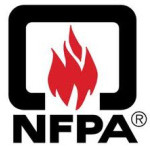- Industry: Fire safety
- Number of terms: 98780
- Number of blossaries: 0
- Company Profile:
Established in 1896, NFPA's mission is to reduce the worldwide burden of fire and other hazards on the quality of life by providing and advocating consensus codes and standards, research, training, and education.
The mechanical locks or pawls that prevent movement of the sections of an aerial device when the power is shut off or in the event of loss of pressure in hydraulic circuits.
Industry:Fire safety
The movement of the powered rescue tool from the fully closed or retracted position to the fully open or extended position and returned to the fully closed or retracted position.
Industry:Fire safety
The operative units of the control system comprised of the starter device(s) and power conversion equipment used to drive an electric motor, or the pumping unit used to power hydraulic control equipment.
Industry:Fire safety
The mode of manual fire control in which the only fire suppression activities taken are limited to those required to keep a fire from extending from one area to another.
Industry:Fire safety
The numerical rating of the health, flammability, and self-reactivity, and other hazards of the material, including its reaction with water, specified in NFPA 704, StandardSystemfortheIdentificationoftheHazardsofMaterialsforEmergencyResponse.
Industry:Fire safety
The ongoing evaluation of members who are at risk of suffering adverse effects from stress or from exposure to heat, cold, or hazardous environments.
Industry:Fire safety
The person designated within the incident command system as rescue group/division officer responsible for direct supervision of the rescue team operations.
Industry:Fire safety
The minimum and maximum concentrations of a combustible material, in a homogeneous mixture with a gaseous oxidizer, that will propagate a flame.
Industry:Fire safety
The movement area of an airport, adjacent terrain, and buildings or portions thereof, access to which is controlled.
Industry:Fire safety
